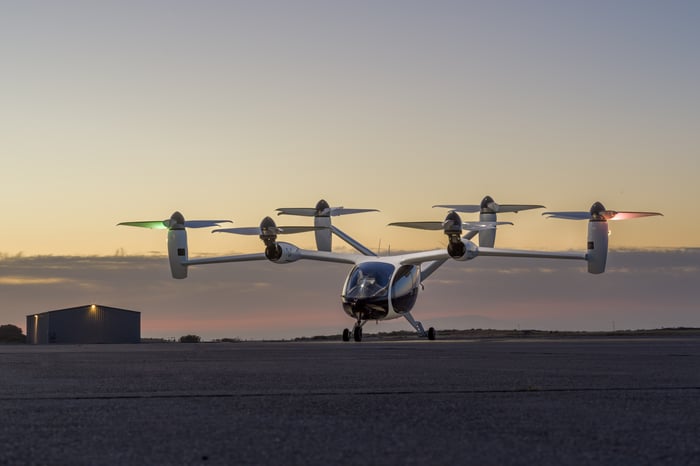Imagine a world where your daily commute takes to the skies, seamlessly gliding over traffic snarls and ground-level chaos. Electric vertical takeoff and landing (eVTOL) aircraft are set to revolutionize urban mobility, blending the agility of helicopters with the sustainability of electric power.
These innovative flying machines promise to drastically reduce travel time and environmental impact with zero emissions. As they prepare for liftoff into mainstream transportation, eVTOLs represent the dawn of a new era. The market opportunity is massive, too, with some projecting that the total addressable market for urban air mobility could grow to $1 trillion by 2040.
Where to invest $1,000 right now? Our analyst team just revealed what they believe are the 10 best stocks to buy right now. See the 10 stocks »
Joby Aviation (NYSE: JOBY) is one company at the forefront of this exciting technology, having worked on it for the last decade and a half. Here's what investors can look forward to as we head into 2025.
Flying taxis could revolutionize transportation
Joby Aviation has spent the past 15 years developing eVTOLs, also known as flying taxis. These flying vehicles can take off, land, and hover vertically, using electric motors powered by modern battery technology.
The eVTOLs have numerous advantages, including the ability to operate in small spaces, making them ideal for urban transportation. These vehicles are similar to helicopters, except they are emission free and significantly quieter thanks to their electric motors. Joby's focus on urban air mobility (UAM) means its offerings will likely include advanced booking systems, partnerships with ride-sharing platforms, and dedicated service routes.
However, the technology has other exciting use cases, too. For example, these nimble aircraft could navigate remote or difficult-to-access areas, making them great for search and rescue missions. They could also be used for transporting essential medical supplies and other cargo that needs to be delivered quickly and efficiently. Finally, these aircraft could be great for military purposes, including reconnaissance, troop transportation, and medical evacuations.

Image source: Joby Aviation.
Here's what's next for Joby Aviation in 2025
Joby is one of the top companies in the eVTOL space, with Archer Aviation being one of its top competitors. Unlike Archer, Joby takes a vertically integrated approach, developing and manufacturing its components and systems in-house, while Archer relies on legacy aerospace suppliers.
The foundation for air taxis is being laid out. In October, the Federal Aviation Administration (FAA) took a significant step toward the future of advanced air mobility (AAM) travel by releasing its final Special Federal Aviation Regulation (SFAR) on powered-lift pilot certification and operation. The new rule paves the way for the widespread use of air taxis and is viewed as "broadly positive" by the investment bank Canaccord.
In November, Joby broke ground on constructing its first "vertiport" in its planned Dubai air taxi network. Located at Dubai International Airport (DXP), the vertiport will include two take-off and landing stands equipped with its Global Electric Aviation Charging System to support rapid charging and conditions between flights.
Joby aims for initial flights in Dubai in the first half of 2025, with full commercialization coming in the latter half of the year. The vertiport at DXB is the first of four locations, with additional vertiports planned for development in Palm Jumeirah, Dubai Downtown, and Dubai Marina.
From there, the company plans to expand its air taxi service to high-density markets, including New York City and Los Angeles. Before that happens, Joby Aviation will seek FAA Type Certification. This certification process ensures that Joby's flying vehicles meet the required safety and airworthiness standards, which will be pivotal for its timeline for achieving commercial operations.
Thus far, Joby has completed three of the five stages to achieve this certification. In its third-quarter presentation for shareholders, the company said it is in the testing and analysis phase and has submitted several documents to the FAA relating to an array of systems, including propeller systems, electric models, flight controls, etc.
Is Joby Aviation right for your portfolio?
Joby is one of the top companies developing eVTOL technology, which could revolutionize transportation as we know it. The market opportunity is vast, with Morgan Stanley projecting that the future urban air mobility market could grow to $5 trillion by 2050.
The company has made excellent progress. It's closer to getting all of its necessary approvals and is building out the infrastructure to support its air taxi network. Next year, Joby could launch its innovative travel technology for the public in Dubai.
However, it will take time for Joby to scale manufacturing and achieve commercial operations on a larger scale, leaving the stock best suited for very aggressive investors with a long-term investment time horizon.
Should you invest $1,000 in Joby Aviation right now?
Before you buy stock in Joby Aviation, consider this:
The Motley Fool Stock Advisor analyst team just identified what they believe are the 10 best stocks for investors to buy now… and Joby Aviation wasn’t one of them. The 10 stocks that made the cut could produce monster returns in the coming years.
Consider when Nvidia made this list on April 15, 2005... if you invested $1,000 at the time of our recommendation, you’d have $859,342!*
Stock Advisor provides investors with an easy-to-follow blueprint for success, including guidance on building a portfolio, regular updates from analysts, and two new stock picks each month. The Stock Advisor service has more than quadrupled the return of S&P 500 since 2002*.
*Stock Advisor returns as of December 23, 2024
Courtney Carlsen has positions in Morgan Stanley. The Motley Fool has no position in any of the stocks mentioned. The Motley Fool has a disclosure policy.
The views and opinions expressed herein are the views and opinions of the author and do not necessarily reflect those of Nasdaq, Inc.


